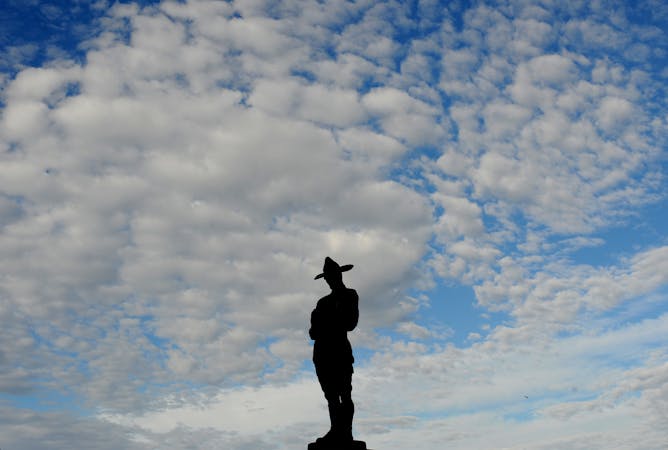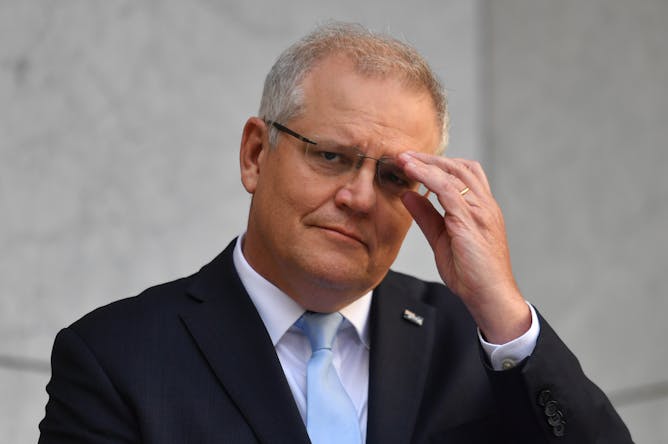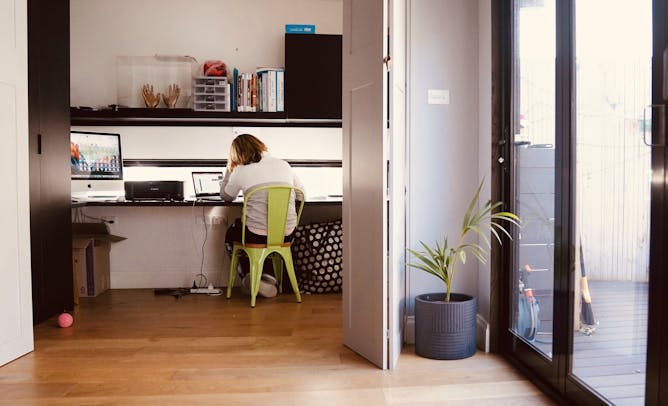|
|
|
Editor's note
|
|
With lock-down measures still in place to manage the coronavirus pandemic, Australians and New Zealanders are preparing for a very different Anzac Day this year. On April 25, we’ll still remember those who have served in the armed forces – but from our homes and driveways. Traditional Anzac Day marches have been put on hold for this year.
But as Frank Bongiorno writes, it is not the first time Anzac Day has been interrupted by a global pandemic. In 1919, with the first world war only just ended, Spanish Influenza was devastating Australia – by April 25, the number of deaths in New South Wales alone was approaching 1,000.
So while some people will be disappointed the marches cannot go ahead this year, 2020 will be remembered as the year we once again adapted to the circumstances and, in the face of another global health crisis, found a different way to remember those who have served.
|
Amanda Dunn
Section Editor: Politics + Society
|

|
|
Top story
|

AAP/Paul Miller
Frank Bongiorno, Australian National University
As Spanish flu ravaged the world in 1919, Australians found novel ways to commemorate Anzac Day, and they will do so again this year.
|

Mick Tsikas/AAP
Michelle Grattan, University of Canberra
With the coronavirus curve now flattened, Scott Morrison is now hunting for steroids to drive up the curve of Australia's national productivity.
|

Michael Dodge/AAP
Bruce Mountain, Victoria University; Kelly Burns, Victoria University; Steven Percy, Victoria University
Those endless cups of tea while working from home are unlikely to add much to your electricity bill. But coronavirus poses other problems for the electricity sector.
|

丁亦然/UpSplash
Richard Holden, UNSW
For the app to work well, we might need an 80% take-up. Unless it is made mandatory, we'll need both private and social incentives.
|
Cities
|
-
Geoff Hanmer, University of Adelaide
Construction employs one in ten Australians, with a broad range of skills, using mostly locally made materials. Building social housing would meet urgent social needs as well as creating jobs.
|
|
Environment + Energy
|
-
Paul Hardisty, Australian Institute of Marine Science; Christian Roth, CSIRO; Damien Burrows, James Cook University; David Mead, Australian Institute of Marine Science; Ken Anthony, Australian Institute of Marine Science; Line K Bay, Australian Institute of Marine Science; Mark Gibbs, Queensland University of Technology; Peter J Mumby, The University of Queensland
Restoring the reef represents one of the most significant science and technology challenges in the history of nature conservation.
|
|
Business + Economy
|
-
Patrcia Ranald, University of Sydney
Investor State Dispute Settlement Procedures open the prospect of legal cases it would cost Australia millions to defend.
-
Jeff Borland, University of Melbourne; Bob Gregory, Australian National University; John Freebairn, University of Melbourne; Roger Wilkins, University of Melbourne; Sue Richardson, University of Adelaide
The ABS is providing near real-time data like never before. It's labour force survey remains the most authorative way of tracking the labour market.
|
|
Science + Technology
|
-
Katherine Kirkwood, Queensland University of Technology
According to Google Trends, 'Dalgona coffee; has become the most searched type of coffee worldwide, overtaking previous highest peaks for all other kinds of coffee.
|
|
Arts + Culture
|
-
Timothy Kazuo Steains, University of Sydney; Shannon Whiley, The University of Queensland
Reflecting on the wartime treatment of two Japanese Australians (or Nikkei) raises the spectre of our racist past - and can prompt us to consider the vulnerabilities of Asian Australians today.
-
Ros Ben-Moshe, La Trobe University
Dads have taken over TikTok since social isolation began. More than a way to kill time at home, laughter and fun dancing times can build family bonds, reduce stress and cultivate a resilient mindset.
|
|
Health + Medicine
|
-
Clare Collins, University of Newcastle; Jenna Hollis, University of Newcastle; Lauren Williams, Griffith University
Without doing more exercise or cutting down on food, most women will gain weight as they go through menopause. But it's not inevitable.
-
Krushil Watene, Massey University
When our COVID-19 lockdowns end, we can't afford to stop caring about collective well-being. NZ is well positioned to show the world how it's done – if we listen to Māori and other diverse voices.
-
Arindam Basu, University of Canterbury
As New Zealand prepares to ease its lockdown from April 28, new COVID-19 clusters are likely to emerge – but a combination of testing and contact tracing should be able to stamp out major outbreaks.
-
James Sharman, University of Tasmania; Mark Nelson, University of Tasmania; Markus Schlaich, University of Western Australia
Measure your blood pressure at home, check in with your GP, and keep an eye on your diet and exercise.
-
Stephen Duckett, Grattan Institute
If you're scheduled for surgery in a private hospital, the hospital or surgeon will contact you. Public hospital patients shouldn't expect to hear from the hospital until we hear more from the states.
|
|
Education
|
-
Ly Tran, Deakin University; George Tan, University of Adelaide
The Australian government relies on the temporary graduate visa to attract international students. But these visa recipients are left helpless as they face a loss of financial security.
|
|
Politics + Society
|
-
Bates Gill, Macquarie University; Adam Ni, Macquarie University
China has embarked on ambitious reforms to modernise the People's Liberation Army to be able to defeat the US in a potential conflict. But many challenges remain.
|
|
| |
Featured jobs
|

|
— Canberra ACT, Australia
|
|
|
|
| |
| |
| |

|
| |
| |
| |
Featured Events & Courses
|

|
Online, Victoria, 3010, Australia — University of Melbourne
|

|
Sydney (Venue TBC), Sydney, New South Wales, 2000, Australia — Australia New Zealand School of Government
|

|
Online webinar, Perth, Western Australia, 6027, Australia — Edith Cowan University
|

|
Level 21, 15 Broadway, Ultimo 2007, Sydney, Australian Capital Territory, 2007, Australia — University of Technology Sydney
|
|
|
|
| |
| |
| |
| |
| |
|
|
|
|
|
|
|